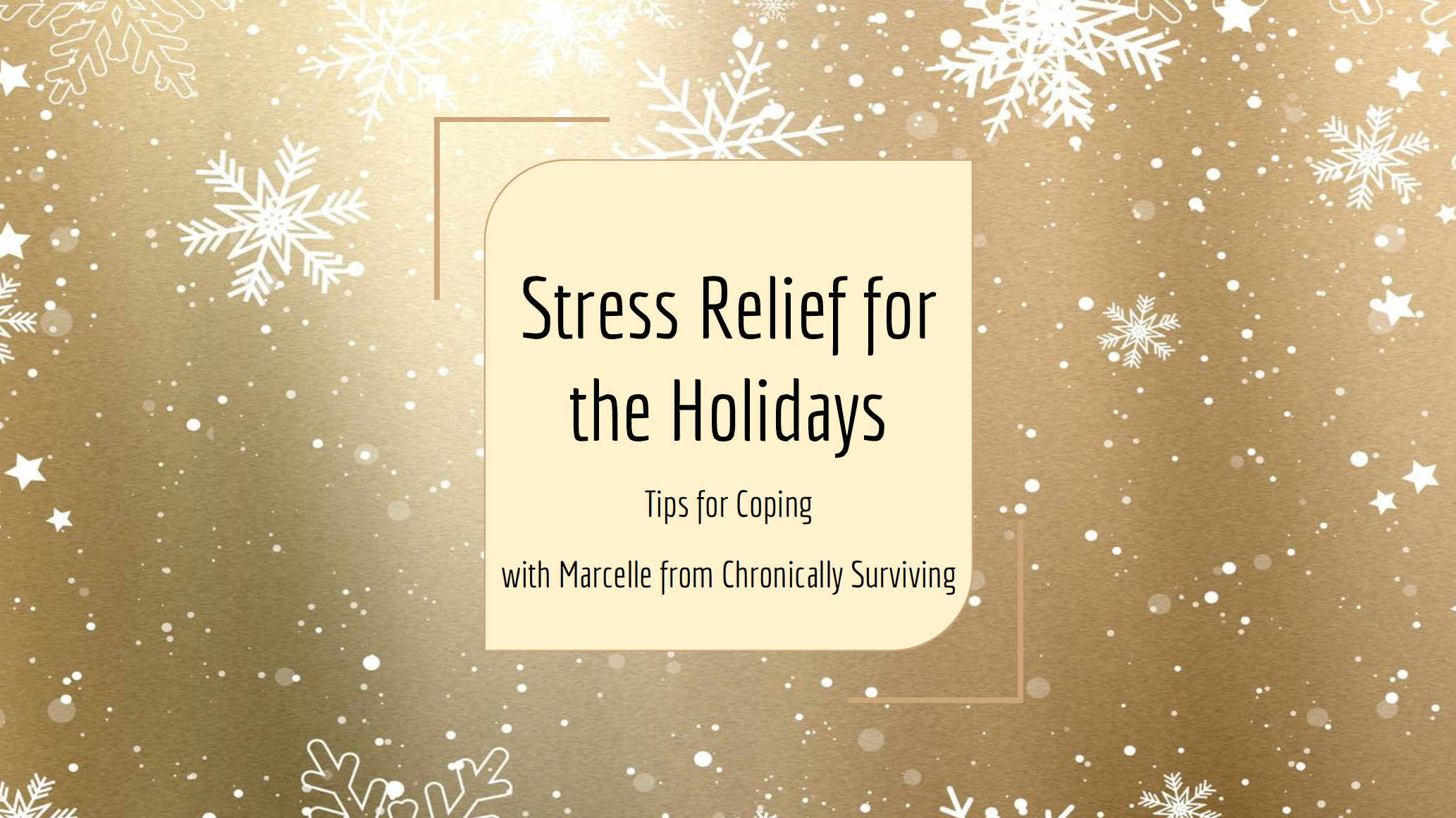Stress Relief for the Holidays
Graphic titled “Stress Relief for the Holidays” in the centre in black text. Subtitled “Tips for Coping with Marcelle from Chronically Surviving” below the title, also in black text. The background is gold with white snowflakes scattered in different shapes and sizes.
The holidays have arrived, and some of us may be feeling a range of emotions, and most likely, some level of stress, especially since we're still amid this global pandemic.
I had the pleasure to be invited to present for the monthly Mito Expert Series a couple of weeks ago to discuss accessible ways to relieve stress during the holidays. MitoAction provides support, education, outreach, advocacy, and research support for those affected by mitochondrial disease.
During the presentation, I provided concrete tips to help cope with the stress of the holidays. It was so well received, I decided to write this blog as it may be helpful for others to manage stress during this chaotic time of year. At the end of this blog post, I've also provided links to my talk's audio and video recordings. I urge you to check it out as you might find new ways of reducing stress during the holidays.
Stress and The Holidays
Family get-togethers can take up a lot of energy for many reasons. A get-together can include many personal questions, opinions, and physical challenges like travel and long periods without rest. For many getting together with family can be challenging. Not everyone's family is supportive, and some do not understand the challenges of being chronically ill. There can also be awkward questions, or they may offer their opinion about how they feel you should handle your situation.
These get-togethers can take a physical toll on us as well. We may have to travel, go long periods without rest, or be expected to help out with meals or watch younger family members. Just know that if you find these events challenging, your feelings are valid, and you are not alone.
Stress causes a shift of your nervous system away from its baseline by releasing mobilizing energy. Although you can't always control what happens to you, allowing your mind-body system to function optimally is ultimately going to help manage stress throughout the holidays.
Reminders During The Holiday Season:
It's ok to put boundaries around specific topics and walk away if needed.
It's your decision how much time you choose to spend with your family. It's your holiday too!
Not everyone will be on the same page with you about specific topics or understand you, and that's ok.
Have a game plan and exit strategy before any gatherings. Preparedness will help prevent the same issues from happening.
Values and Boundaries
The importance of setting boundaries lies in power gained when you become aware of what you know you can and can't tolerate for the holidays. We have to get so much better, especially around the holidays, in setting boundaries because when we overcommit, our stress levels go way up.
Boundaries are huge. And boundaries, people have to remember, they are simple statements. Don't set boundaries that are too long with lots of apologies and explanations because people get lost, and they don't even know what they're saying. They are simple statements letting people know either what you need or what you're expressing and why.
Ex: "thank you for inviting to your party. I have other plans. have a great time" Period. That's it. That's all that a boundary is.
Graphic titled “Happy Holidays” in the centre in black cursive letters surrounded by silver and gold snowflakes and stars on a white background.
Struggling To Make Boundaries? Ask Yourself:
What am I saying yes to by saying no to this?
By letting go of this, what am I making space for?
Why is their comfort more important than my own?
Is prioritizing my needs selfish or self-care?
Remember: boundaries are how we show others how to love us and show love towards ourselves.
Healthy Boundaries and Help Setting Them
Identification:
Who do you struggle to establish healthy boundaries with? Your children? Your coworkers?
Identifying the source of the leak makes a big difference.Spectrum:
Boundaries fall on a spectrum from porous to rigid.
Porous Boundaries: Difficulty saying no; Oversharing personal information; Overly concerned with the opinions of others.
Rigid Boundaries: Reluctance to ask for help; Over-protective of personal information; Avoids close relationships.
The goal is to move everything as close to the middle as possible.Integration:
You want your boundaries to match your values so that your actions match your desires.
Value time with your family? Set stronger boundaries around work.
If you value peace, set strong boundaries around who gets access to you.
Get Clear on Your Values
A lot of the assessments that helped me figure out my core personal values focus on answering these questions:
What are My Top Experiences?
Questions to consider:What brings me joy?
What moments in my life stand out as times when I felt happy and fulfilled?
What values was I honoring in those instances?
What are My Suppressed Values?
Questions to consider:
When am I the most unhappy, resentful, frustrated, or stifled?
What was going on?
What values were not being fulfilled at these times?
What is My Personal Code of Conduct?
Questions to consider:
What is most important to me and in my life?
What do I need to experience fulfillment? Love? Health? Wealth? Learning and growth?
Tips and Tricks
When stress is at its peak, it's hard to stop and regroup. So try to prevent stress, especially if the holidays have taken an emotional toll on you in the past, according to the Mayo Clinic, follow these tips:
Be Realistic. Even though your holiday plans may look different this year, you can find ways to celebrate. As families change and grow, traditions and rituals often change as well. Find new ways to celebrate together, such as sharing pictures, emails, or videos. Or meet virtually on a video call.
Set Aside Differences. Try to accept family members and friends as they are, even if they don't live up to all of your expectations. Chances are they're feeling the effects of holiday stress and depression, too. Set aside grievances until a more appropriate time for discussion.
Plan Ahead. Set aside specific days for shopping, baking, connecting with friends, and other activities. This will help prevent last-minute scrambling.
Learn to Say No. Saying yes when you should say no can leave you feeling resentful and overwhelmed. Loved ones ought to understand if you can't participate in every project or activity.
Take a Breather. Make some time for yourself. Spending just 15 minutes alone, without distractions, may refresh you enough to handle everything you need to do. Find something that reduces stress by clearing your mind, slowing your breathing, and restoring inner calm.
Seek Professional Help If You Need It. Despite your best efforts, you may be stressed, plagued by physical complaints, unable to sleep, irritable and hopeless, and unable to face routine chores. If these feelings last for a while, talk to your doctor or mental health professional.
A young Métis disabled woman is seated and bending over to one side in a yoga posture. She has long dark curly hair in a ponytail and wearing a white tank top and black yoga pants. Dark stability bands can be seen on her inner elbows and ankles. Large green leaves can be seen between her and the white wall in the background.
Conserve Your Energy
Holidays can be challenging for anyone, but people with chronic illnesses often have it even harder. So here are a few things every Spoonie should remember year-round and especially during the holidays:
Don't let people make you feel guilty for missing a holiday event. It's not your fault if you cannot make it, and it's not fun to be at home sick instead of celebrating.
If you conserve your energy to go out and celebrate, don't let others push your limits or question why you are out today and not yesterday or tomorrow.
Suppose you get stuck with people questioning you at a holiday gathering. In that case, it's not your responsibility to answer all of their questions. If you want to, you can tell them you don't want to tell about it or point them in a direction to get answers somewhere else. they are all acceptable responses
If you can go somewhere but cannot bring something to a potluck-type event, that's fine. Your presence is more than enough.
If you have food allergies, it's ok to question the host ahead of time to find out if you will have options or bring something of your own. It's not rude and could seriously affect your holiday experience.
If dressing up all the way is not an option for you, then it's not an option. Remember that your comfort is valid if you don't feel like it.
If you can, it's good to have someone with you that knows about your condition and can offer support if something happens.
Above all, listen to your body. Honor your limits. You are the one that suffers when the boundaries are pushed, so don't let someone else push them; instead, that's your decision and your decision alone.
Tools: Mindfulness, Breathwork, and Reflection
See the audio and video recordings linked below in the Resources for specific stress-relief tips and self-soothing exercises, including accessible movement/yoga and relaxation meditation.
Wishing you a safe and peaceful holiday season from the Chronically Surviving family to yours!
Resources
Click Here for Recording of the Stress Relief for the Holidays presentation is embedded below or you can watch it on YouTube (*see below for embedded video)
Click Here for more details regarding the MitoAction Expert Series—Stress Relief for the Holidays — including audio recording
Marcelle’s Accessible Mindfulness Resources: Asintmah Accessible Mindfulness
MitoAction Website: www.mitoaction.org
Marcelle Longlade is a passionate advocate for young adults living with chronic conditions and disabilities, providing multifaceted support through her platform Chronically Surviving. She has been battling with multiple rare chronic conditions from a young age, the main diagnoses being Familial Mediterranean Fever (FMF), Narcolepsy Type 1/with Cataplexy, and connective tissue disorder of hEDS. She is also the leader of the Blog Spotlight, amongst other roles, at Our Odyssey. Marcelle believes in the magical healing that happens when we share our stories, and how it helps empower and support one another through our own odysseys. Follow her on social media @ChronicallySurviving.Asintmah.




